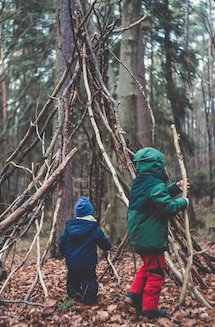In an emergency, preparedness is key. Teaching children basic survival skills can save lives. Here, we cover essential survival skills that every child should learn, from knife safety to finding shelter. Life is unpredictable, so equip your kids with these skills to handle unexpected situations with confidence.

1. How to Safely Use a Knife
Knives are tools that can help in survival situations when used correctly. Teach kids to respect knives, not fear them. Show them how to hold, use, and store knives safely. A small pocket knife can be a practical tool to keep in their pack during outdoor adventures.
2. How to Sharpen a Blade
Keeping a blade sharp is crucial for it to be useful. Teach children to maintain their knives by using a sharpening tool, which they can easily carry in their packs. Learning this skill enhances their understanding of blade care and safety.
3. How to Start a Fire
 Fire is essential in survival for warmth, cooking, and signaling for help. Teach kids how to start a fire safely and explain the importance of fire in cold environments. Show them how to gather dry wood and kindling and stress safety and responsibility when handling fire.
Fire is essential in survival for warmth, cooking, and signaling for help. Teach kids how to start a fire safely and explain the importance of fire in cold environments. Show them how to gather dry wood and kindling and stress safety and responsibility when handling fire.
4. How to Find Safe Drinking Water
Water is essential for survival, but it must be safe to drink. Teach children to find water sources and how to purify water by boiling or using tools like a life straw. Knowing how to filter and purify water can prevent illness from contaminated sources.
5. Finding or Building Shelter
Keeping out of the elements is crucial in survival situations. Teach children to use natural surroundings to create a shelter, such as using sticks for a lean-to, tree branches for shade, or even constructing a snow tent in cold climates. Finding shelter can help them stay warm, dry, and safe.
6. Basic First Aid
Basic first aid skills can be life-saving. Teach children how to clean and bandage wounds, treat minor burns, and understand what to do in an emergency. A well-prepared child can assist others or even save a life in a crisis.
7. Using a Compass and Determining Direction
 Knowing how to use a compass can help kids find their way if they become lost. Teach them how to determine direction and practice using a compass for fun, like finding markers in a park. With practice, they’ll gain the confidence to navigate their surroundings safely.
Knowing how to use a compass can help kids find their way if they become lost. Teach them how to determine direction and practice using a compass for fun, like finding markers in a park. With practice, they’ll gain the confidence to navigate their surroundings safely.
8. Self-Defense Skills
Self-defense is valuable for personal safety and confidence. Teach children the basics of self-defense, emphasizing awareness and how to avoid dangerous situations. Starting early helps them build essential skills for self-protection.
9. How to Read a Map
GPS may not always be available, so map-reading skills are essential. Show children how to read different types of maps, such as general reference and topographical maps. Understanding maps can help them navigate through unfamiliar areas.
Thinking about your child needing survival skills can be unsettling. However, teaching them now could make all the difference in an emergency. Equip them with these skills, and they will be better prepared to face the unexpected.










